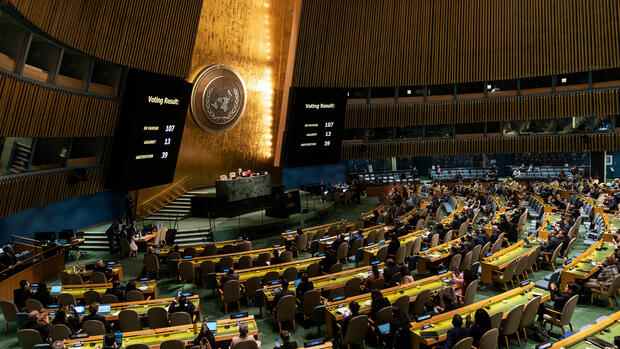143 states voted in favor of the resolution against Russia on Wednesday.
(Photo: IMAGO/Pacific Press Agency)
Geneva Russia suffers another bitter defeat at the United Nations: The plenary assembly of the world organization on Wednesday condemned Russia’s land grabbing in Ukraine with an overwhelming majority. After a heated debate, the New York assembly condemned as “illegal” the “so-called referenda” in Ukrainian territories and the attempted annexations by Russia.
In an emergency meeting, 143 states such as Germany and the USA voted for a corresponding resolution. Only five countries voted against: Russia, its close allies Belarus and Syria, as well as North Korea and Nicaragua. The General Assembly also recorded 35 abstentions. Among them were China and India, which shied away from openly supporting Russia.
Russia has thus further isolated itself through its brutal armed conflict against Ukraine in the UN. In addition to the General Assembly, which had already sharply denounced Moscow’s war of aggression in three resolutions, other UN institutions such as the Human Rights Council also disapproved of the aggressive regime of Russian President Vladimir Putin.
However, in the Security Council, potentially the most powerful UN body, Russia’s veto power has nothing to fear. In the Security Council, Putin’s emissaries can block all unwelcome draft resolutions – which has happened several times since Russia’s invasion of Ukraine.
Top jobs of the day
Find the best jobs now and
be notified by email.
It is true that the General Assembly resolution that has now been adopted has no binding effect under international law. Nevertheless, in possible negotiations with Russia, the Ukrainians can refer to the overwhelming support of their position from other countries: the document signals international unity against aggressors. If the General Assembly had not reacted, it would be “a license for other countries to do the same or to recognize what Russia has done,” explained the European Union Ambassador to the UN, Olof Skoog.
Condemnation of sham voting
In addition to calling on Russia to reverse the annexation of the Ukrainian regions of Luhansk, Donetsk, Kherson and Zaporizhia, the resolution states that Moscow’s actions violate the sovereignty and territorial integrity of the neighboring country and are incompatible with the principles of the UN Charter. The annexations have “no validity under international law”.
UN overwhelmingly condemns ‘attempted illegal annexation’ by Russia
It demands that Russia “immediately, completely and unconditionally withdraw all its military forces from the territory of Ukraine within its internationally recognized borders”. In September, Moscow organized mock votes in the four regions on joining Russia. After an allegedly huge approval of the populations, Putin annexed the territories.
During the session of the General Assembly, the Ambassador of Ukraine to the UN Sergiy Kyslytsya strongly denounced Russia and its officials: “When the Russian delegation enters the General Assembly, it leaves a trail of blood and the hall is filled with the smell of smoldering human flesh”. , he said, to continue: “This is what we have tolerated in Syria. This is what is happening in Ukraine today.”
Russia’s military is fighting on the side of the Assad regime in the Syrian conflict. US Ambassador Linda Thomas-Greenfield and dozens of other top diplomats also condemned Russia’s imperialism and underlined that the annexation of the Ukrainian regions was not valid.
Russia’s Ambassador Wassilli Nebensya, on the other hand, launched a rhetorical counterattack. The Western alliance, NATO, “only wants to escalate the conflict to weaken the Russian Federation,” he claimed, stressing that the Western powers were supplying the “regime” in Kyiv with deadly weapons.
In the run-up to the vote, Kremlin diplomacy suffered a setback. Ambassador Nebensia tried to get a secret vote on the annexation resolution in the general assembly. The Russians calculate that more countries could side with Moscow in a covert vote than in an open process.
But the Russian initiative met with too much resistance. Ultimately, there was a roll-call vote, the result of which appeared immediately on the Internet. The whole world witnessed yet another Russian defeat on the diplomatic front with its own eyes.
More: You can read all developments in the Ukraine war in the Newsblog.
